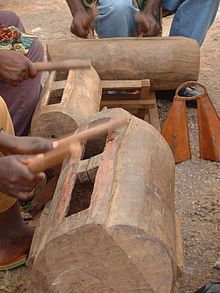- Makossa
-
Music of Cameroon 
Bamileke drummersGenres Specific forms Regional music Makossa is a type of music that is most popular in urban areas in Cameroon. It is similar to soukous, except that it includes strong bass rhythm and a prominent horn section. Makossa, which means "(I) dance" in Duala,[1] originated from a type of Duala dance called kossa, with significant influences from jazz, ambasse bey, Latin music, highlife and rumba. While the makossa style began in the 1950s, the first recordings were not seen until a decade later. Artists such as Eboa Lotin, Misse Ngoh and especially Manu Dibango popularized the style outside of Cameroon in the late 1960s. Makassi is a lighter style of makossa. Makossa in the 80's saw a wave of mainstream success across Africa, and to a lesser extent, abroad, as latin influences, Martinican zouk, and pop music changed its form.
The two musicians largely credited with modernizing makossa are sax player Manu Dibango and Emmanuel Nelle Eyoum. Eyoum started using the term 'kossa, kossa' in his songs with his group Los Calvinos. But it was Emmanuel 'Manu' Dibango who popularized it to the world with his song "Soul Makossa", which came out in the early 1970s. The chant from the song, 'mamako, mamasa, maka makossa', was later used by Lionel Richie in "All Night Long", Michael Jackson, in "Wanna Be Startin' Somethin'" and many other performers throughout the years (see Soul_Makossa - The refrain and its adaptations). The 2010 World cup also brought Makossa style to the international stage as Shakira sampled the Golden Sounds popular song, Zamina mina (Zangalewa) and brought the Makossa sound again to the international stage.
- Yerima Afo Akom
- Koto Bass
- Dina Bell
- Diboué Black
- Marcel Bwanga
- Lapiro de M'Banga
- Ben Decca
- Douleur
- Ndedi Eyango
- Toto Guillaume
- Awilo Longomba
- Longue Longue
- Eboa Lotin
- Bebe Manga
- John Minang
- Petit-Pays
- Sergeo Polo
- Sam Fan Thomas
- Zangalewa (Golden Sounds)
Notes
- ^ George Echu. "Multilingualism as a Resource: the Lexical Appropriation of Cameroon Indigenous Languages by English and French". http://www.inst.at/trans/13Nr/echu13.htm. Section "Cultural-based terms" (last line)
References
- West, Ben (2004). Cameroon: The Brandt Travel Guide. Guilford, Connecticut: The Globe Pequot Press Inc.
External links
Genres of African popular music Categories:- Cameroonian music
- Makossa
- African popular music
- Cameroonian styles of music
Wikimedia Foundation. 2010.
